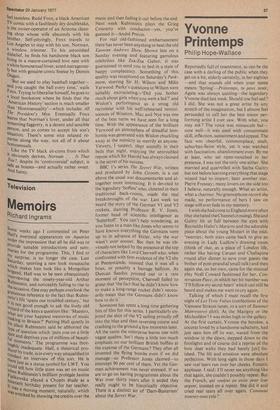Television
Memoirs
Richard lngrams
Some weeks ago I commented on Peter "all's overpaid appearances on Aquarius under the impression that all he did was to Provide suitable introductions and summanes for the programme. This, I find to nlY surprise, is no longer the case. Last SIturday, sporting a new look moustache t, hmich makes him look like a Mongolian Hall was to be seen obsequiously Interviewing the • ninety-year-old Arthur kLuhinstein, and noticeably failing to rise to the occasion. One may perhaps overlook the gratuitous reference to the fact that Rubins.teM's life 'spans our troubled century,' but is not good enough to ask the lively old Wizard of the keys a question like : 'Maestro, what are your happiest memories of music nhl.aking in Britain ?' Putting Hall quietly in is Place Rubinstein said he abhorred the ,.Yrre of question which 'puts you on a little 9ot and deprives you of millions of beautiiul moments.' The programme was thoro,UghlY inadequate. Hall, a theatrical produce by trade, is in every way unqualified to e`qionduct an interview of this sort. He is there Just as a status symbol for LWT. You Could tell how little store was set on music When Rubinstein's brilliant protegee Janina h.lalkowska played a Chopin etude as a “itMenett. 11 birthday present for her teacher. was a moving moment, naturally, which as wrecked by showing the credits over the music and then fading it out before the end. Next week Rubinstein plays the Grieg Concerto with conductor—yes, you've guessed it—Andre Previn.
For real old-fashioned embarrassment there has never been anything to beat the old
Eamonn Andrews Show. Shown late on a Sunday evening and featuring garrulous celebrities like Zsa-Zsa Gabor, it was guaranteed to send you to bed in a state of happy complacency. Something of this quality was recaptured on Saturday's Parkinson, starring Sir H. Wilson and Mike Yarwood Parky's questions to Wilson were suitably excruciating—'Did you bother much about girls when you were a lad ?' and Wislon's performance as a smug old raconteur with his well-rehearsed reminiscences of Winston, Mac and Nye was one of the best turns we have seen for a long time. With the appearance of the brilliant Yarwood an atmosphere of dreadful bonhomie was generated with Wislon chuckling away at the mimicry as merrily as anyone. Viewers, 1 suspect, slept soundly in their beds that night, enjoying the untroubled repose which Sir Harold has always claimed is the secret of his success.
BBC I's series The Secret War, written and produced by John Groom, is a cut above the usual war documentaries and altogether more interesting. It is devoted to the legendary 'boffins' who, closeted in their traditional back-rooms, made the real breakthroughs of the war. Last week we heard the story of the German VI and V2 rockets, starring Professor R. V. Jones, former head of scientific intelligence as 'Superboff'. You can't help wondering, as you listen to a man like Jones who seems to have known everything the Germans were up to in advance of Hitler, why the war wasn't over sooner. But then he was obviously not helped by the presence at the top of characters like Lord Cherwell who, when confronted with firm evidence of the V2 site at Peenemiinde, insisted that it was all a hoax, or possibly a barrage balloon. As Duncan Sandys pointed out in a rare moment of perception, Cherwell failed to grasp that 'the fact that he didn't know how to make a long-range rocket didn't necessarily mean that the Germans didn't know how to do it.'
Someone has spent a long time gathering bits of film for this series, I particularly enjoyed the shot of the V2 sailing proudly off into the blue and then reversing course and crashing to the ground a few moments later. All the same the enterprise leaves one with vague qualms. Isn't there a little too much emphasis on our brilliant British boffins at the expense of the Germans? They after all invented the flying bombs even if we did manage—so Professor Jones claimed—to intercept 90 per cent of them. Yet the German achievement was never stressed. If we are to go on having programmes about the War over thirty years after it ended they really ought to be historically objective. There is a distinct air of 'Dam-Busterism' about the Secret War.










































 Previous page
Previous page